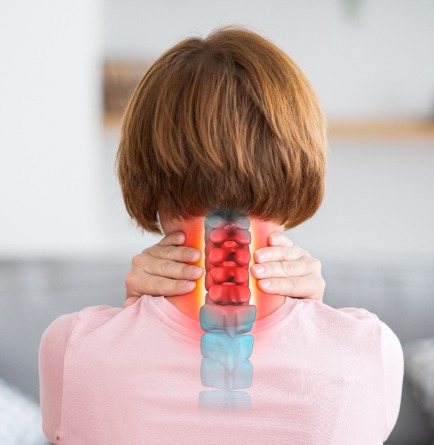Cervical Spondylosis
Cervical spondylosis refers to age-related changes and wearing of spine in the neck region. It’s a very common condition, especially in individuals over 50, and often contributes to other spinal issues like migraine, vertigo. Though it may sound concerning, it’s a natural part of the aging process and develops slowly over time.

Common Signs & Symptoms of Cervical Spondylosis
Cervical spine stiffness often develops silently, and many people may not notice symptoms until the condition progresses. Some of the most common signs include:
- Neck and shoulder stiffness or pain, especially in the morning
- Tingling or numbness in the arms, hands, or shoulders
- Muscle weakness in the upper limbs
- Reduced coordination and slower reflexes
At Chakrasiddh, we specialize in natural, non-invasive therapies that address the root causes of cervical spine disorder to restore spinal balance and improve daily functioning.
Posture Habits to Watch Out For:
Poor posture is one of the leading factors that can aggravate symptoms:
- Slouching while sitting at your desk
- Hunching over mobile devices
- Sleeping without proper neck support
Tips for Neck-Friendly Posture:
Practicing good posture can reduce the strain on your neck and slow the progression of neck joint degeneration:
- Keep your screen at eye level
- Sit upright with shoulders relaxed
- Use a chair with good back and neck support
- Take breaks to stretch and change positions
- Sleep with a supportive pillow that maintains the neck’s natural curve
Frequently Asked Questions
How is cervical spondylosis diagnosis?
Diagnosis usually starts with an assessment of symptoms such as neck pain, stiffness, headaches, or tingling in the arms, and physical examination to check neck movement, muscle strength, sensation, and reflexes. Imaging tests like X-rays and MRI provide detailed views of discs, spinal cord, and nerves. At Chakrasiddh, the diagnosis also involves understanding the body’s energy flow using traditional Siddha principles. Practitioners assess posture, muscle tightness, and energy blockages through gentle observation and pressure point evaluation to design a personalized therapy plan.
How to cure cervical spondylosis?
Chakrasiddh offers a non-invasive approach that includes therapies like pressure manipulation, Varmam point activation, yoga-based movements, and diet adjustments. These methods help reduce inflammation and pain while supporting long-term recovery without relying on medication or surgery. The therapy naturally focuses on releasing muscle tensions, improves flexibility, and corrects energy imbalances.
Which is the best treatment for cervical spondylosis?
People have started understanding that medications give only temporary relief and so have shifted focus on long-lasting relief through holistic therapies that addresses the root cause of the ailment. Chakrasiddh’s Siddha-based treatments are considered highly effective as they combine energy therapy, deep tissue pressures, lifestyle correction, and yoga. The therapy not only reduces pain but also works on the root cause of cervical spine degeneration for sustained results.
What is the fastest way to cure spondylosis?
While there’s no instant cure, many individuals start noticing improvement within a few sessions at Chakrasiddh. The fastest way to recover involves consistent therapy sessions focused on pressure point healing, posture correction, relaxation techniques, and simple daily exercise practices. These help reduce nerve compression and boost healing without side effects.
What are the worst symptoms of cervical spondylosis?
Some of the most troubling symptoms include chronic neck pain, reduced mobility, numbness or tingling in the arms, and occasional dizziness or headaches. In advanced stages, people might experience weakness in the hands. Chakrasiddh helps manage these symptoms by restoring natural energy balance and relieving spinal pressure through traditional therapies.
What are the symptoms of cervical spondylosis?
Common symptoms include morning stiffness, localized neck pain, and reduced range of motion. If left untreated for many days it can also lead to radiating pain to the shoulders or arms, tingling in the fingers, headaches that begin at the base of the neck and limited neck movements.
Chakrasiddh addresses these issues through a blend of Siddha healing techniques and personalized care to improve overall spinal health.
What should be avoided in cervical spondylosis?
To protect the cervical spine and reduce strain, it’s important to avoid:
- Long hours of screen time without proper posture
- High or uneven pillows
- Heavy lifting or jerky neck movements
- Cold and processed foods
- Physical or emotional stress
Chakrasiddh also guides patients on lifestyle changes and daily habits that support healing and prevent recurring pain.
